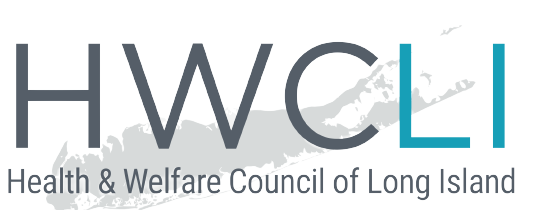Policy & Advocacy
We work with local, state, and federal government partners to advocate for effective policy decisions that will impact our neighbors and hometowns.
Coalitions & Grass Roots Organizing
We bring together nonprofits, business leaders, and lawmakers to discuss solutions to our region’s challenges.
Direct Services
We operate a series of programs that connect Long Islanders with the services they need.
Welcome to the Health & Welfare Council of Long Island
At the Health & Welfare Council of Long Island (HWCLI), our work is to ensure that our region is a welcoming and inclusive place for everyone to live. We can set the standard for what an equitable region looks like. That means safe communities, decent, affordable housing, healthy food, access to care and an opportunity to thrive. In our quest for improvements and systemic change, we face a unique set of obstacles. In fact, the poverty rate today is at its highest since 1959. Given the current assault on the country’s most vulnerable communities, our work is more important than ever.
Our Impact
11350 |
People served in 2023 alone |
76 |
Years Serving Long Island |
200+ |
Partnering Organizations |
Recent News
April 12, 2024
U.S. Census: Long Island children under 5 undercounted at rate higher than nationwide
Updated April 12th, 2024
Read on Newsday
By Olivia Winslow
Children under the age of 5 on Long Island were undercounted in the 2020 Census at a rate even higher than New York state or national rates, according to experimental data released by the U.S. Census Bureau on Thursday, which noted that young children were undercounted in every state.
The issue of census undercounts of young children in particular, along with some minorities, is something the Census Bureau has acknowledged is a long term problem despite efforts to address it, experts said.
“It’s really sad that the census for a couple of decades now has consistently missed so many children under 5,” said Steven Romalewski, mapping service director at the CUNY Graduate Center for Urban Research. “There are a lot of reasons for that,” continued Romalewski, who was a consultant for Long Island groups doing census 2020 outreach efforts, “but overall it’s really terrible for the nation [that] we’re not accurately counting such an important part of the population.”
The agency said it was redoubling its efforts by putting together a working group to study the issue and come up with solutions as it prepares for the 2030 Census.
The decennial census drives an estimated $2.8 trillion a year in federal funding to states and localities for a variety of services and programs, and affects planning by businesses and municipalities.
The undercounting is significant because states use census counts to distribute money to a range of programs, including those aimed at improving the health and nutrition for children. The Census count also plays a role in planning for school enrollment and spending.
Children under 5 undercounted by 1 millionThe bureau said in a news release that the number of children ages 0 to 4 counted in the 2020 Census was about 1 million fewer than the estimate — 19,462,879 were estimated, but 18,400,235 were counted in the 2020 Census — for an undercount of 5.46%.
“The Census Bureau recognizes historical undercounts of young children in our decennial census as well an underrepresentation in our demographic surveys,” Census Director Robert Santos said in a statement. “We know these undercounts are often correlated with undercounts of certain race and ethnicity groups along with other factors that we were not able to measure directly.”
“This was a larger undercount than any other age group,” the bureau said.
The Census Bureau said the estimated counts were derived using an experimental “Demographic Analysis” that uses new data to focus on children, using administrative records, such as birth records, international migration and Medicare records, and adjusted for migration between counties. The Census numbers represent those actually counted through self-reporting or canvassing.
New York State was among 14 states and the District of Columbia that posted undercount rates of children under 5 that were higher than the national rate, the Bureau said. New York's undercount rate was 5.75%.
The rate for Nassau and Suffolk counties was even higher: 7.83% in Nassau and 9.15% in Suffolk. According to the Census Bureau's analysis. Nassau had an estimated 75,039 children ages 0 to 4, while the 2020 Census counted 69,160. Suffolk had an estimated 79,849 children ages 0-4, while the 2020 Census counted 72,546.
Two reasons given for low countWilliam O'Hare, a consultant to Count All Kids Coalition, an advocacy group,” said there were two main reasons for the undercount of children under 5.
“They have a lot of characteristics associated with people being missed: higher poverty, younger parents, renters.” Secondly, he said, according to a survey his group did in 2019, “When you ask parents if they plan to include young children in the census, 10% said they were not planning to include their young child on the census and 8% said they were not sure.”
He said further questioning revealed “most of them didn't think there was any need for the government to know about young children until they go to school. So that's why they have the highest undercount,” one that he said was “increasing in every census.”
Romalewski and others noted that the Census count was also affected by how the COVID-19 pandemic upended overall census efforts. The lockdown caused not only the Census Bureau to pause door-to-door census canvassing, but organizations involved in census outreach had to pivot from in-person events to other methods.
But if communities don't have accurate information on how many children will be coming into a school district, needed resources may not be available, Romalewski said.
“It’s not like those children aren’t there. They are there. When they show up at schools and there are not enough teachers to teach them … everyone gets hurt,” Romalewski said. “All of sudden classrooms are crowded. There's not enough funding to provide resources to the kids, so everyone gets hurt.”
Rebecca Sanin, now a Suffolk County legislator (D-Huntington Station), was chief executive of the Health & Welfare Council of Long Island when she coordinated the Island's 2020 census outreach efforts. She thought the “stresses” faced by new parents generally, compounded with economic stress “and the isolation of the pandemic” were contributing factors to the undercount.
Vanessa Baird-Streeter, who as a Suffolk deputy county executive was involved in 2020 census outreach efforts and now heads the Health & Welfare Council of Long Island, said during outreach events, “We were hearing, when talking with our community-based organizations and talking to people, we heard 'When I filled out the census I wasn't thinking about my child in my response.' I think that’s one piece.”
Baird-Streeter added: “We have complex living arrangements on Long Island, due to lack of affordable housing. We have multi-generations living together,” or households with unrelated people living together. So who gets included on the census sometimes depends on who is answering it, she said.
CORRECTION: The amount of federal funds distributed to states, communities, tribal lands and other recipients using census data in whole or in part is $2.8 trillion in fiscal year 2021, according to a U.S. Census Bureau study. The percentage of children undercounted in Brooklyn in the 2020 Census was 6.98%. A prior version of this story and an accompanying chart, listed incorrect numbers.
WHAT TO KNOW Children under the age of 5 on Long Island were undercounted in the 2020 Census at a rate even higher than New York State or national rates, according to the Census Bureau Young children were undercounted in every state in the nation in 2020, the Census said The undercounting affects how government money is allocated to programs impacting children.March 8, 2024
February 14, 2024
M&T Foundation awards $675K to six Long Island nonprofits
By Adina Glenn
Posted on February 13th, 2024
Read on LIBN
The M&T Charitable Foundation, the philanthropic arm of M&T Bank, has awarded $675,000 in grants to six Long Island nonprofits. The grants are part of $8.2 million that the foundation awarded to 68 nonprofits across New England, Long Island and Rockland County.
This grants are through the foundation’s “Amplify Fund,” a $25 million philanthropic investment that was announced in 2022 and stemmed from the merger between People’s United Bank and M&T Bank. The initiative aims to work with groups that are dedicated to “addressing social issues through a racial equity and social justice lens in low- and moderate- income communities and underrepresented populations,” according to M&T Foundation.
For this second round of funding, M&T had announced a call for proposals in August of 2023. The foundation sought initiatives from nonprofits that worked to solve a specific issue with a focus on either family stability, income and wealth equity, workforce development or health equity.
On Long Island, the funding was awarded to Community Action Southold Town in Southold, Erase Racism in Syosset, EAC in Garden City, Health and Welfare Council of Long Island in Huntington Station, Long Island FQHC in Westbury, and Northwell Health in New Hyde Park.
“At M&T, addressing the institutionalized and systemic issues preventing disadvantaged communities from accessing opportunities and achieving long-term success is key to our mission as a community-focused bank,” Dominique Goss, executive director of the M&T Charitable Foundation said in a written statement.
“We are proud to provide the Amplify Fund as a difference-making resource in the communities we serve and look forward to continuing our work to increase racial and economic equity throughout our footprint,” Gross added.
The grants ranged from $50,000 to $150,000 on Long Island.
“The Health Equity Taskforce and Northwell Health are committed to advancing health equity for vulnerable and marginalized populations throughout Long Island,” Dr. Debbie Salas-Lopez, senior vice president of Community and Population Health at Northwell Health, said in a written statement.
“This generous grant from the M&T Bank Charitable Foundation’s Amplify Fund will advance our work to strengthen the youth mental health ecosystem throughout Nassau and Suffolk counties,” Salas-Lopez said.
“With improved access to mental health services, education, and support, the Health Equity Taskforce will realize a significant and sustainable impact on the mental health of Long Island’s underrepresented youth,” Salas-Lopez said.
The M&T Foundation will offer a third round of grants, which will be announced later this year.
Events
Join us in creating a future for Long Island in which everyone has an equal opportunity to prosper and thrive.
Join Our Network
Subscribe to Our Newsletter
Copyright ©2024 HWCLI. All Rights Reserved. Designed by FBC
























